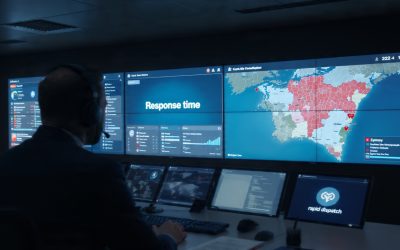The 5 Essential Layers of Commercial Security Every Business Needs.
In today’s fast-paced and ever-evolving business landscape, the significance of commercial security cannot be overstated. Businesses face a myriad of threats, ranging from theft and vandalism to cyberattacks and data breaches. The repercussions of inadequate security measures can be devastating, leading to financial losses, reputational damage, and even legal ramifications.
As such, understanding the importance of commercial security is paramount for any organization aiming to protect its assets, employees, and customers. Moreover, a robust security framework not only safeguards physical and digital assets but also fosters a sense of trust among stakeholders. Employees feel safer in an environment where security measures are visibly implemented, which can enhance productivity and morale.
Customers are more likely to engage with businesses that prioritize their safety and privacy. Therefore, investing in comprehensive security solutions is not merely a protective measure; it is a strategic business decision that can lead to long-term success. Peace of mind is our priority when it comes to your security needs.
Physical Security Measures for Businesses
Physical security measures form the first line of defense against potential threats to a business. These measures encompass a variety of strategies designed to deter unauthorized access and protect physical assets. Common physical security solutions include perimeter fencing, security guards, and access control systems.
By establishing a secure perimeter, businesses can significantly reduce the risk of break-ins and vandalism. In addition to barriers and personnel, businesses should consider implementing surveillance systems such as closed-circuit television (CCTV) cameras. These systems not only act as a deterrent but also provide valuable evidence in the event of an incident.
Regular maintenance and monitoring of these systems are crucial to ensure they function optimally. Furthermore, integrating physical security measures with electronic systems can create a more cohesive security strategy that addresses various vulnerabilities.
Electronic Security Systems for Comprehensive Protection
As technology continues to advance, electronic security systems have become essential components of a comprehensive security strategy. These systems include alarm systems, motion detectors, and high-definition cameras that provide real-time monitoring capabilities. Tom Khawly, founder of Alpha Security Corp, emphasizes the evolution of technology in this field: “The technology has evolved dramatically in the last 15 years.
Today, analogue systems are a thing of the past, replaced by IP systems and high-definition technology.” Modern electronic security systems offer features that allow users to monitor their properties remotely through mobile devices like laptops and smartphones. This capability provides instant access to security footage from anywhere in the world, enabling business owners to stay connected to their premises even when they are away. Additionally, these systems can be programmed to send alerts for unusual activities or breaches, allowing for swift responses to potential threats.
Access Control and Surveillance for Secure Environments
Access control is a critical aspect of maintaining secure environments within commercial spaces. By regulating who can enter specific areas of a business, organizations can minimize the risk of unauthorized access and potential threats. Various access control methods exist, including key cards, biometric scanners, and PIN codes.
Each method offers different levels of security and convenience, allowing businesses to choose the best fit for their needs. Surveillance systems complement access control measures by providing continuous monitoring of premises. High-definition cameras can capture detailed footage of activities within and around a business, serving as both a deterrent and a tool for investigation.
The integration of access control and surveillance creates a layered approach to security that enhances overall protection. This synergy not only helps in preventing incidents but also aids in identifying vulnerabilities that may need addressing.
Cybersecurity Measures to Safeguard Digital Assets
In an increasingly digital world, cybersecurity has become an essential component of commercial security strategies. Businesses store vast amounts of sensitive information online, making them prime targets for cybercriminals. Implementing robust cybersecurity measures is crucial for safeguarding digital assets against threats such as hacking, phishing attacks, and malware.
To bolster cybersecurity defenses, businesses should adopt practices such as regular software updates, strong password policies, and employee training on recognizing potential threats. Firewalls and encryption technologies can further protect sensitive data from unauthorized access. Additionally, conducting regular cybersecurity assessments can help identify vulnerabilities within a company’s digital infrastructure, allowing for timely remediation before any breaches occur.
Integrating Security Layers for Maximum Protection
A multi-layered approach to security is essential for maximizing protection against various threats. By integrating physical security measures with electronic systems and cybersecurity protocols, businesses can create a comprehensive security framework that addresses multiple vulnerabilities simultaneously. This layered strategy ensures that if one line of defense fails, others remain in place to mitigate risks.
For instance, combining access control systems with surveillance cameras allows for real-time monitoring of who enters and exits a facility while also capturing footage for later review. Similarly, integrating cybersecurity measures with employee training programs ensures that staff members are equipped to recognize potential threats in both physical and digital environments. This holistic approach not only enhances overall security but also fosters a culture of vigilance within the organization.
Training and Education for a Security-Conscious Culture
Creating a security-conscious culture within an organization is vital for ensuring the effectiveness of any security measures implemented. Employees play a crucial role in maintaining security; therefore, providing them with training and education on best practices is essential. Regular workshops and seminars can help staff understand the importance of adhering to security protocols and recognizing potential threats.
Moreover, fostering open communication about security concerns encourages employees to report suspicious activities without fear of reprisal. When employees feel empowered to take an active role in maintaining security, it creates a collective responsibility that enhances overall protection. A well-informed workforce is better equipped to respond effectively to incidents, ultimately contributing to a safer work environment.
Emergency Response Planning for Unforeseen Events
Despite the best efforts to implement robust security measures, unforeseen events can still occur. Therefore, having an emergency response plan in place is crucial for minimizing the impact of such incidents. This plan should outline clear procedures for responding to various emergencies, including natural disasters, thefts, or cyberattacks.
Regular drills and simulations can help ensure that employees are familiar with emergency protocols and know how to react in high-pressure situations. Additionally, establishing communication channels for disseminating information during emergencies is vital for keeping everyone informed and safe. A well-prepared organization can respond swiftly to crises, reducing potential damage and ensuring business continuity.
Security Audits and Risk Assessments for Proactive Measures
Conducting regular security audits and risk assessments is essential for identifying vulnerabilities within an organization’s security framework. These assessments provide valuable insights into potential weaknesses that may need addressing before they become significant issues. By proactively evaluating security measures, businesses can implement necessary changes to enhance their overall protection.
Security audits should encompass all aspects of an organization’s operations, including physical security measures, electronic systems, and cybersecurity protocols. Engaging third-party experts can provide an objective perspective on existing vulnerabilities and recommend best practices tailored to the specific needs of the business. This proactive approach not only strengthens security but also demonstrates a commitment to safeguarding assets and personnel.
Partnering with Professional Security Services for Expertise
Navigating the complexities of commercial security can be daunting for many businesses. Partnering with professional security services can provide organizations with the expertise needed to develop effective security strategies tailored to their unique needs. These professionals bring extensive knowledge of industry best practices and emerging threats, ensuring that businesses remain one step ahead.
Professional security services can assist in designing comprehensive security plans that integrate physical measures with electronic systems and cybersecurity protocols. Additionally, they can provide ongoing support through regular assessments and updates as technology evolves. By leveraging the expertise of these professionals, businesses can enhance their overall security posture while focusing on their core operations.
Investing in Security for Long-Term Business Success
Ultimately, investing in comprehensive security measures is not just about protecting assets; it is about ensuring long-term business success. A strong security framework fosters trust among employees and customers alike while minimizing risks associated with theft or data breaches. As Tom Khawly notes regarding the evolution of technology: “Modern IP systems allow users to monitor their property remotely through mobile devices like laptops and smartphones.” By prioritizing security as an integral part of business strategy, organizations position themselves for sustainable growth in an increasingly competitive landscape.
The financial investment in robust security measures pays dividends in the form of reduced losses from incidents and enhanced reputation among stakeholders. In conclusion, businesses that recognize the importance of comprehensive security will not only protect their assets but also pave the way for future success in an ever-changing environment.
In addition to understanding the five essential layers of commercial security every business needs, it’s also important to consider how specific security systems can enhance safety in various environments. For instance, the article on how hotel access control systems keep guests safe provides valuable insights into the importance of access control in the hospitality industry, highlighting how these systems can protect both guests and property while ensuring a secure environment.
FAQs
What are the 5 essential layers of commercial security?
The 5 essential layers of commercial security typically include physical security, access control, surveillance systems, cybersecurity measures, and employee training. These layers work together to protect a business from various threats.
Why is physical security important for businesses?
Physical security helps prevent unauthorized access, theft, vandalism, and other physical threats to a business’s property, assets, and personnel. It includes measures such as locks, barriers, security guards, and alarm systems.
How does access control enhance commercial security?
Access control systems regulate who can enter or exit specific areas within a business. This can involve key cards, biometric scanners, or PIN codes, ensuring only authorized personnel have access to sensitive locations.
What role do surveillance systems play in business security?
Surveillance systems, such as CCTV cameras, monitor and record activities within and around a business. They deter criminal activity, provide evidence in case of incidents, and help in real-time monitoring.
Why is cybersecurity a critical layer in commercial security?
Cybersecurity protects a business’s digital assets, including data, networks, and systems, from cyber threats like hacking, malware, and data breaches. It involves firewalls, encryption, antivirus software, and secure passwords.
How does employee training contribute to commercial security?
Employee training educates staff on security policies, recognizing threats, and proper response procedures. Well-informed employees can prevent security breaches and respond effectively to incidents.
Can these security layers be customized for different types of businesses?
Yes, the implementation of these security layers can be tailored based on the size, industry, location, and specific risks associated with a business to provide optimal protection.
Is it necessary to implement all five layers simultaneously?
While integrating all five layers provides comprehensive security, businesses may prioritize certain layers based on their unique needs and resources, gradually building a multi-layered security approach.
How often should businesses review and update their security measures?
Businesses should regularly review and update their security measures, ideally annually or whenever there are significant changes in operations, technology, or emerging threats, to maintain effective protection.










